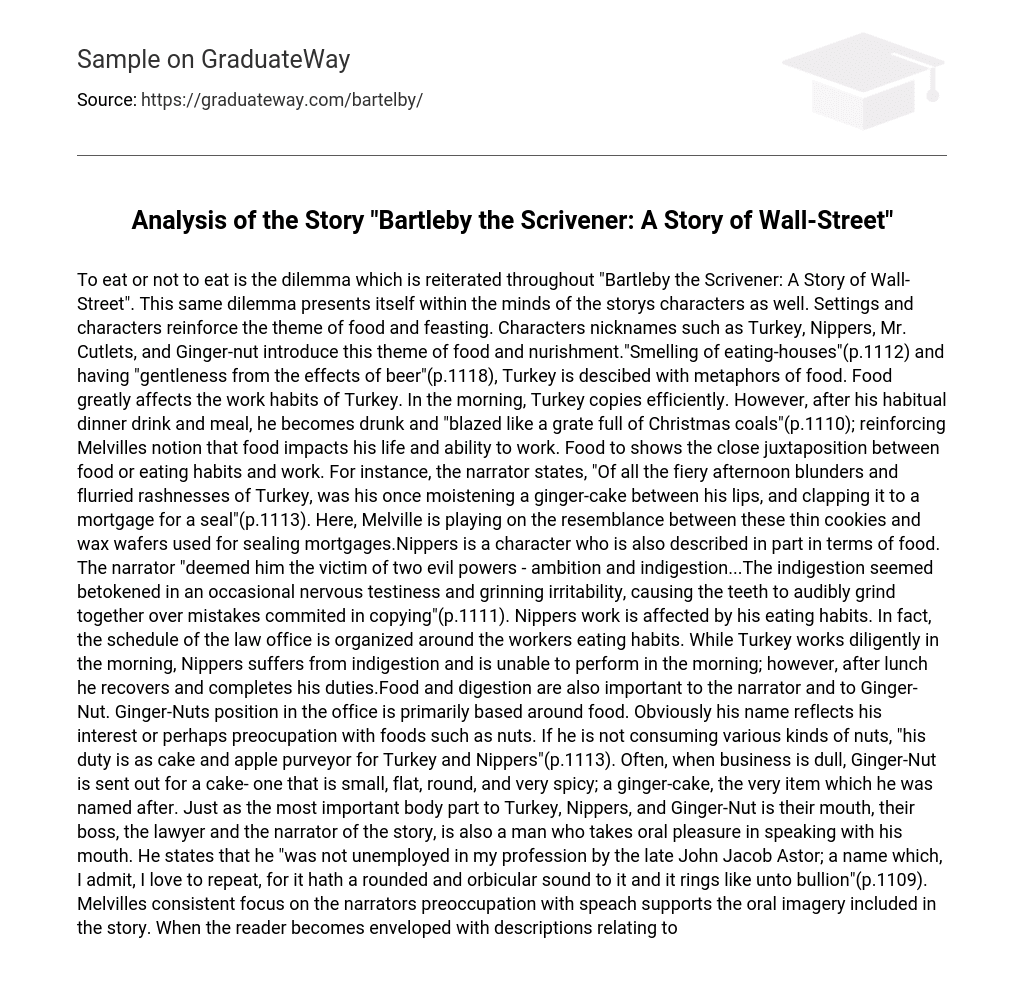To eat or not to eat is the dilemma which is reiterated throughout “Bartleby the Scrivener: A Story of Wall-Street”. This same dilemma presents itself within the minds of the storys characters as well. Settings and characters reinforce the theme of food and feasting.
Characters nicknames such as Turkey, Nippers, Mr. Cutlets, and Ginger-nut introduce this theme of food and nurishment.”Smelling of eating-houses”(p.1112) and having “gentleness from the effects of beer”(p.1118), Turkey is descibed with metaphors of food. Food greatly affects the work habits of Turkey. In the morning, Turkey copies efficiently. However, after his habitual dinner drink and meal, he becomes drunk and “blazed like a grate full of Christmas coals”(p.1110); reinforcing Melvilles notion that food impacts his life and ability to work.
Food to shows the close juxtaposition between food or eating habits and work. For instance, the narrator states, “Of all the fiery afternoon blunders and flurried rashnesses of Turkey, was his once moistening a ginger-cake between his lips, and clapping it to a mortgage for a seal”(p.1113). Here, Melville is playing on the resemblance between these thin cookies and wax wafers used for sealing mortgages.Nippers is a character who is also described in part in terms of food. The narrator “deemed him the victim of two evil powers – ambition and indigestion…The indigestion seemed betokened in an occasional nervous testiness and grinning irritability, causing the teeth to audibly grind together over mistakes commited in copying”(p.1111). Nippers work is affected by his eating habits.
In fact, the schedule of the law office is organized around the workers eating habits. While Turkey works diligently in the morning, Nippers suffers from indigestion and is unable to perform in the morning; however, after lunch he recovers and completes his duties.Food and digestion are also important to the narrator and to Ginger-Nut. Ginger-Nuts position in the office is primarily based around food. Obviously his name reflects his interest or perhaps preocupation with foods such as nuts.
If he is not consuming various kinds of nuts, “his duty is as cake and apple purveyor for Turkey and Nippers”(p.1113). Often, when business is dull, Ginger-Nut is sent out for a cake- one that is small, flat, round, and very spicy; a ginger-cake, the very item which he was named after. Just as the most important body part to Turkey, Nippers, and Ginger-Nut is their mouth, their boss, the lawyer and the narrator of the story, is also a man who takes oral pleasure in speaking with his mouth. He states that he “was not unemployed in my profession by the late John Jacob Astor; a name which, I admit, I love to repeat, for it hath a rounded and orbicular sound to it and it rings like unto bullion”(p.1109). Melvilles consistent focus on the narrators preoccupation with speach supports the oral imagery included in the story.
When the reader becomes enveloped with descriptions relating to mouths, the concept of food may enter his/her mind.The most unusual character in the story is Bartleby, “a man of such singularly sedate an aspect”(p.1113).When Bartleby first arrives to work at the law firm, “he does an extraordinary quantity of writing. As if long famishing for something to copy, he seemed to gorge himself on my documents. There was no pause for digestion”(p.1114). Bartleby uncontrollably consumes his duties showing his desperation and excessive thirst for work.
In fact, it is apparent that all the characters in the story have some hunger or craving. Because there is a hunger, there must be a character to fulfill the needs of the others. Such a role is occupied by the narrator/lawyer. All of the characters are living off of the lawyer. But, in fact, the narrator too lives off the other workers in the office.
For Turkey and Nippers, the narrator “feeds” them full pay while they contribute only half of the labor assigned to them. All of the realtionships in the story involve a “give and take”. Not only is the “give and take” between Turkey and the lawyer based on Turkeys acceptance of his un-earned salary but also on his acceptance of an old coat. Turkey can not graciously accept the coat given to him by the lawyer without first reminding the lawyer that he is only accepting the gift because he previously gave the lawyer stationary.
The lawyer refuses to take from others and acts, instead, as a primary caregiver.The narrator supports Bartleby as he spoils him by attempting to give him extra money, a place to live, and food through the “grub-man”. The lawyer begins to see that his purpose is fulfilling Bartlebys needs. He becomes his frternal figure. He soon lives “to benefit Bartleby, and sheild him form rude persecution”(pg.1131). Such immense attempts to protect Bartleby show him that the narrator is posing as his brother. However, Bartleby begins to deny his boss requests.
After all, a baby is not expected to have to work in order to be fed by his mother. To punish the lawyer, Bartlebys nurturing sibling, Bartleby denies himself food. Such a tactic inflames the narrators or his “brothers” guilt. As Bartleby, the son, is denied love and acceptance, he denies himself nourishment by refusing to eat. When Bartleby finds no gratification in the world, he “lies on his side, his head touching the cold stone”(p.1133) and dies alone in solitude. Bibliography:





